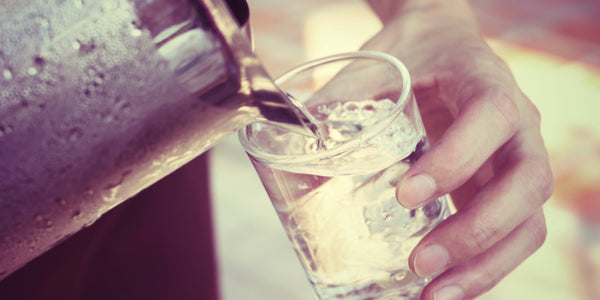
When it comes to good hydration, water is always the top choice.
But why exactly should be drinking it? Is there a recommended daily intake?
Find out the importance of drinking water and how much you should be aiming for each day.
Why Is Drinking Water Good For You?
The intake of water is desirable on a hot day or following an intense workout. But the body's need for water is much more than a personal sensation.
In fact, water makes up about 60 percent of body weight and is found in virtually all cells. That being said, water is a vital component of life and required for the following functions:
• Forms saliva and digests foods to dissolve and utilize nutrients
• Carries out waste products from the body, mostly excreted through the urine
• Fosters cell growth, reproduction, and survivability
• Manufactures neurotransmitters and sends electrical signals throughout the body
• Regulates body temperature, especially through sweat and respiration processes
• Helps to deliver life-sustaining oxygen to all parts of the body
• Lubricates moving joints between bones
• Promotes bowel regularity and digestive health
Research has further concluded water intake may be beneficial in reducing chronic diseases, including cancer and heart disease.
There is a strong link between water and cancer prevention. More specifically, adequate water intake shows to reduce the risks of bladder and colon cancers.
Another study found women who drank at least five glasses daily had a 41 percent lower risk of fatal heart disease. Men had a 54 percent lower risk compared to those who drank just two glasses a day.
How Much Water Per Day?
With such renowned functions and benefits of drinking water, how much should one drink each day? Answering this question is quite generic, as water intake is completely individualized.
However, general recommendations for daily water intake suggest the 8 X 8 rule as a simple framework. This equates to at least 64-ounces a day, or eight, 8-ounce glasses of water. One may also be recommended to drink half their body weight in ounces. For someone weighing 180 pounds, this equates to 90 ounces of water.
The National Academies of Sciences, Engineering, and Medicine also set recommendations based on national data. The data showed women who appear adequately hydrated consume an average of approximately 2.7 liters (11.5 cups) of total water. Hydrated men average approximately 3.7 liters (15.5 cups) daily. To avoid confusion with drinking water only, the report refers to total water from beverages and foods.
Furthermore, water needs may be calculated based on calorie consumption, or 1 milliliter (mL) per calorie. Based on a 2,000-calorie diet, this equals 2,000 mL or 2 liters.
There are additional factors that influence water needs:
• Age: In addition to gender, water recommendations can vary based on age. For instance, infants should mostly consume breast milk or formula for vital growth. But on the opposite end of the spectrum, the elderly population is at high risk for dehydration.
• Pregnancy and breastfeeding: Pregnant or breastfeeding women require additional fluid to stay hydrated. Pregnant women should aim for 10 cups per day. Women who are breastfeeding are also recommended to drink water when feeding.
• Climate: Hot or humid climates and weather can increase sweat, thus requiring additional fluid intake. High altitudes also increase the risk of dehydration.
• Overall health: Health-related instances and conditions can vary fluid needs. One may need to increase water fluids with fever, vomiting, diarrhea, or a urinary infection. Conversely, specific health conditions may trigger the need for fluid restriction, including congestive heart failure and kidney disease. Some medications may also cause a dry mouth and dehydration.
• Exercise: If doing any activity that leads to sweat, drink extra water to compensate for fluid loss. As a general guideline, individuals who vigorously exercise should aim for at least nine cups of water, or 72 ounces. Regular exercisers and athletes are recommended to drink 16 ounces of water leading up to activity. They should also drink six to 12 ounces immediately prior to exercise and every 15 to 20 minutes of active training.
Replenishing electrolytes lost in sweat may be an alternative route for reducing dehydration and electrolyte imbalances in exercisers and athletes. Sports nutrition experts recommend athletes include 30 to 60 grams of carb if exercising for more than one hour. This may include in the form of sports drinks, solids, and gels. The recommendations also extend if exercising in hot and humid conditions.
There is a wide variety of recommendations when it comes to fluid needs. However, consult with a primary care provider to determine a water target based on personal factors. A Registered Dietitian can also be of benefit for identifying a safe, beneficial fluid recommendation.
Additional Considerations and Hydration Tips
Proper hydration is important, but not accomplished by all. In fact, the general population consumes only half of the recommended intake of approximately four cups.
Use these tips to make the most out of water intake and verify the body is hydrated.
• Check urine color:Checking urine color also serves a hydration indicator. A transparent yellow to a pale straw color indicates normal, adequate hydration.
• Find water drinking hacks: Drinking water does not have to a feat. Several easy tips to drink more water daily include using larger water bottles and making them convenient for use. Also add flavor with fresh fruits, consuming them afterwards for greater fluid intake.
• Watch out for liquid calories: Also watch out for sodas, juices, and other sugary beverages. While they can contribute to fluid needs, they tend to supply empty calories. This increases the risk of obesity, diabetes, and other chronic conditions. Unsweetened coffee and tea are just a couple examples of hydration sources.
• Moderate alcohol content: Alcohol, especially in excess, can lead to dehydration. It may also lead to negative outcomes, including cancer, liver disease, and other potentially fatal health conditions.
If choosing to drink alcohol, be sure to limit portions and serving sizes. Men are advised to two alcoholic servings daily, while women are limited to one. Serving sizes also include 12 ounces of regular or light beer, 5 ounces of wine, and 1.5 ounces of liquor. Also watch out for empty calories from mixers often laden in added sugars.







